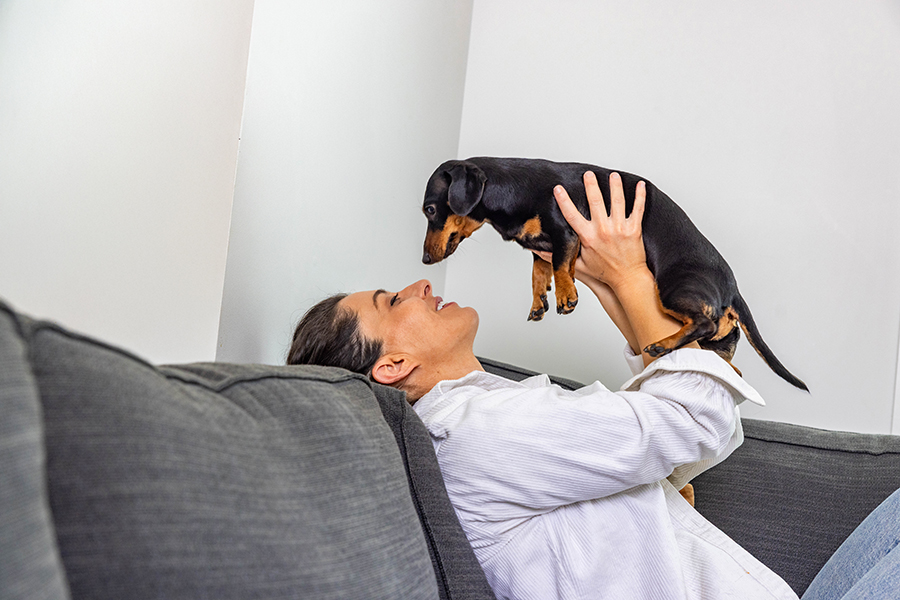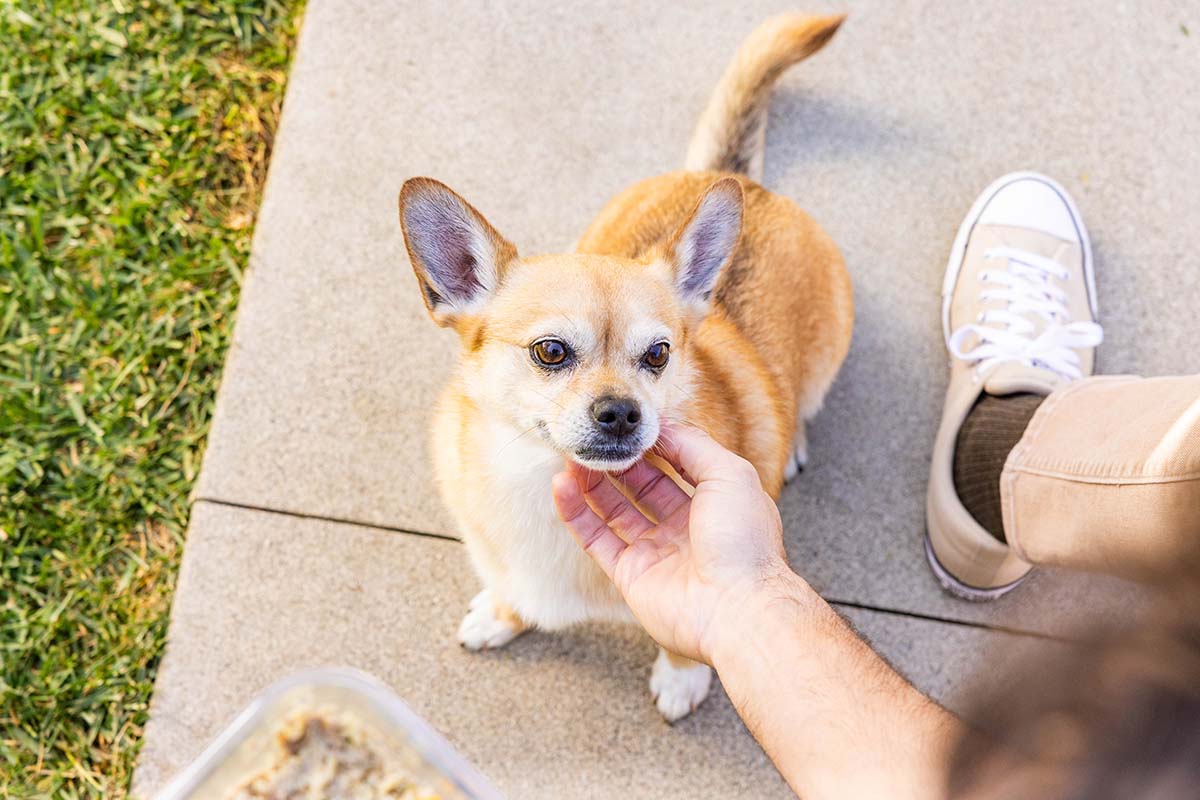Why Does My Dog Burp So Much?
In this post we examine the common causes of excessive burping in dogs and when or if loving pet parents should be worried.
You know when you’re sitting in the living room watching TV, and suddenly your dog lets out a huge burp? You might count yourself lucky that it didn’t come out the other end, but can excess gas or excessive burping be a sign of trouble?
Dog burps, like human burps, result from the formation of excess gas in the stomach or gastrointestinal tract. But can they also indicate some underlying conditions or a need to change your dog’s diet? Let’s examine the common causes of excessive burps and when loving pet parents should be worried.
What Does It Mean?
First, let’s get our terms straight. Flatulence is when there is a formation of excess gas in either the stomach or the intestines. That gas has to go somewhere, so it comes out in the form of dog burps or, well, farts.
The technical term for the expulsion of gas through the anus is actually flatus, and as you probably already know, flatus can be ‘silent but deadly’ in terms of the odor it leaves. The odor is produced by sulfur-containing gases in the intestinal tract.
You might also hear a series of grumbling sounds that are coming from your dog’s gastrointestinal tract (GI tract). Sometimes, you can even hear the grumbling from the other side of the room. This grumbling is called borborygmus.
The other way that gas gets expelled from your dog’s body is through belching, also known as burping. All of this is normal in dogs, just like it is in humans, but there are times when excess gas could indicate an underlying problem.
Occasional burping in dogs is usually not an indicator of an underlying problem, but if there are other symptoms, like diarrhea or weight loss, or if the gas is relentlessly excessive, then it’s time for a visit to the vet.
What Causes Excess Gas Production?
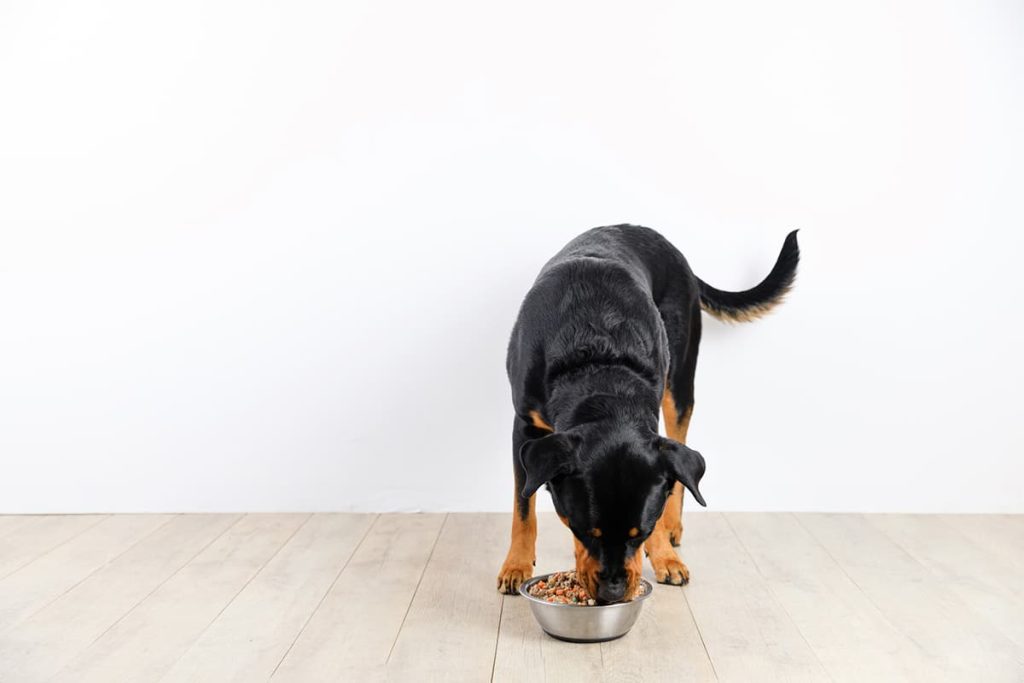
The occasional burp is not indicative of any kind of problem, but where does it come from? There are three main sources of gas production in your doggy.
1. Swallowed Air
If your dog swallows air, which is very common, that causes excess gas and the subsequent flatulence and flatus. Swallowing air is also referred to as aerophagia, and it can happen as a result of gulping air after exercise or eating too fast and swallowing air with food. Usually, swallowed air will exit the body within 2 hours, but this is not the only source of gas.
2. Fermentation in the GI Tract
The second source of excess gas is gas production, which takes place in the GI tract. This is also normal as the bacteria in the colon break down carbohydrates and fiber, though the presence of abnormal bacteria in the GI tract can cause excessive gas production.
3. Diffusion from the Bloodstream
A third main way that gas gets into the GI tract is when it diffuses out of the blood due to partial pressure differences between the blood and the intestines. Most nitrogen in the GI tract gets there by diffusion from the bloodstream, while most hydrogen in the bloodstream comes the other way — from the lumen to the blood.
Of course, the amount of dog burping or flatus varies greatly between individuals, and it depends on a number of factors. But are there health issues that cause excess gas in dogs?
Medical Conditions Associated with Dog Burping

Aside from the more common causes of excess gas production, burping, and flatus, there are some underlying medical conditions that can cause more gas production. Some of these can even be life-threatening, so it’s important for pet owners to be aware of these conditions.
Luminal Obstruction
This is when the lumen (opening through which material passes) of the digestive tract becomes obstructed for some reason. This can be due to a foreign body that your pooch might have swallowed and gotten lodged in his gut, or it can be due to other problems like gastric dilatation-volvulus (GDV).
Of particular note for large or giant dog breeds is GDV, which occurs when the stomach turns over on itself and shuts off access from the esophagus as well as exit from the intestinal tract. This is a life-threatening condition that requires immediate emergency medical care. This condition is also known as bloat because you will see your dog’s stomach bloating up enormously when this happens.
Because the flipping of the stomach shuts off access in both directions, your dog may attempt to belch or vomit unsuccessfully. He will also be in extreme discomfort.
Disease Processes
There are also a number of disease processes that can result in excess gas associated with belching and flatus. Here are a few that can cause your doggy to be gassy:
- Pancreatitis — This can result in the excess production and release of digestive enzymes into the intestinal tract, which causes gas.
- Irritable bowel syndrome (IBS) — Experts hypothesize that IBS causes so much excess gas because it causes problems with the gut bacteria, while others argue patients with IBS can’t tolerate and transport the normal gas in their gut properly.
- Gut motor activity diseases — These include problems like paralysis of the stomach’s normal motility (gastroparesis) and slow transit constipation, where the normal motion of the digestive system — called peristalsis — is slow, resulting in constipation.
- Inflammatory bowel disease (IBD) — This is not the same thing as IBS, and the two digestive issues have very different treatment regimens; however, both can cause excess gas production with the associated burping and flatus.
- Gastrointestinal Reflux Disease (GERD) — When your dog burps and also exhibits regurgitation, even a little, this can indicate GERD. Just as in humans, it’s important to get this treated to avoid permanent damage to the esophagus. This can be a particular problem in brachycephalic breeds of dogs — those with short snouts — like pugs, boxers, and bulldogs, which are already prone to burp more than other breeds.
Parasites and Other Infections
Research shows that parasitic infestations, particularly parasites like Giardia, which undergo periodic intestinal blooms, can also cause excess gas production, leading to burping and flatus. That’s why periodic fecal examinations are a must to prevent the problems associated with parasites.
But parasites are not the only infectious problem that can cause excess gas buildup. Of course, there are gastrointestinal problems that result from changes to the gut’s microbiome, such as might occur after a course of antibiotics or other medications.
There are also, however, other types of disease-causing organisms that can cause excess gas production. These include viruses and fungal pathogens that your DVM will want to check if your pooch is gassy.
Food Allergies
Another common cause of burping in dogs is food sensitivities. Most of the time, these sensitivities are related to the protein in your dog’s food, but other elements can cause them as well.
Other symptoms of food allergies include:
- itchy, inflamed skin that exhibits a rash
- lethargy
- vomiting
- diarrhea
- weight loss.
Treating your dog for food allergies often involves a change in dietary protein sources to alleviate the symptoms.
Are There Emotional/Behavioral Problems That Cause Dog Burping?
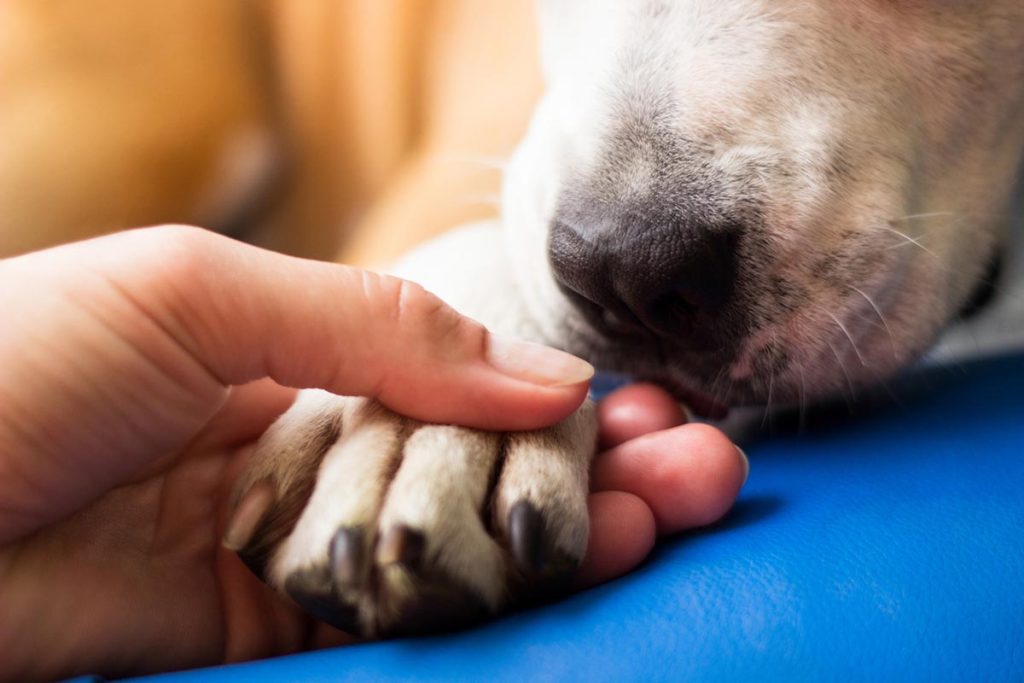
There is research that has shown that dogs that have problems with anxiety are more likely to swallow air that leads to excess gas, burping, and flatus. It has also shown that it could predispose some dogs to developing bloat.
Dogs that are more fearful are likely to gulp air as they get nervous. They are also more likely to produce stomach acid as a result of stressful feelings. While stress and anxiety are common causes of excess gas production, there are other behaviors that can do the same.
Another common behavior associated with excess gas production is eating too fast. Many dogs gulp down their food without even chewing, and this can easily result in excessive burping. Particularly if your dog is a brachycephalic breed, you might try a slow feeder food bowl to get him to slow it down.
When Does Dog Burping Indicate a Health Problem?
How can you distinguish between normal burping and something that is a problem? Here are a few things to look for:
Change in Frequency
If your dog just occasionally burps, it’s not an emergency, but if there is a sudden change in the frequency or nature of his burping, that could signal gastrointestinal problems. If he only usually burps once in a while, but lately, he’s been burping after every meal, for example, you might need to change his diet.
Burping and Vomiting
If your dog’s burping is accompanied by vomiting, that could be a sign of bloat or some other serious medical problem. It’s important to get this checked out before the problem becomes more serious.
It’s also important to realize that vomiting is different from regurgitation. Regurgitation is passive, while vomiting is active. If you see your dog’s abdominal muscles contracting, that’s vomiting, whereas if he passively opens his mouth and material comes out, that’s regurgitation.
Both can indicate gastrointestinal issues, but it’s important for the vet to know what is happening when your dog burps.
Foul Smelling Breath
Bad breath can indicate GI issues, such as IBD. If your dog’s burps smell funny after starting a new medication, that might be normal, but if he hasn’t had anything new, it could indicate more serious problems, like kidney disease. While it doesn’t warrant an emergency visit, an appointment with your veterinarian is in order.
What Can You Do to Reduce Your Dog’s Gas?
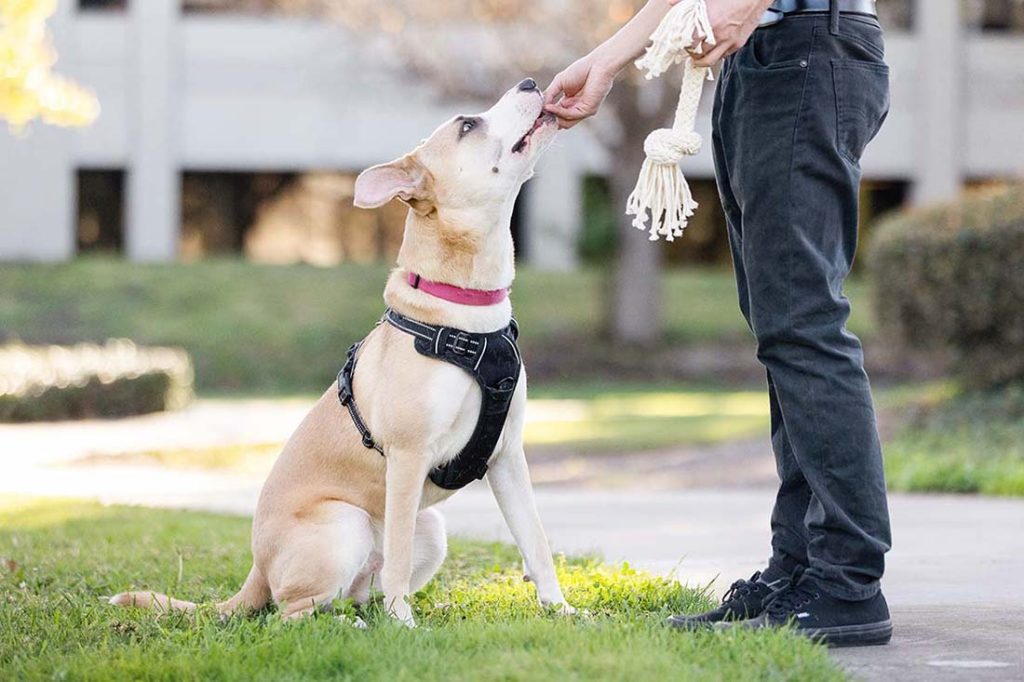
There are some dietary changes you can make to help reduce your dog’s normal gas production, and the subsequent flatus and belching that results. Diet is often a factor in gas production, particularly the carbohydrate and protein elements found in your dog’s food.
Those substances often reduce the residues that are normally available to the colonic bacteria for fermentation. By feeding a high-quality diet, making careful dietary changes, using probiotics as appropriate, and slowing his roll, you can reduce the gas. Here are some recommendations:
Careful Changes
If you introduce a new food to your dog too quickly, it can cause gastrointestinal problems, such as excess gas production. If you’re making a change, you want to do it gradually. Replace a small amount of the old food with the new menu, and then slowly increase the amount of the new food over a week or two.
Probiotics Might Help
If your dog has had a course of antibiotics or other problems that can reduce the beneficial bacteria in his gut, you might consider adding probiotic supplements. It can even be in the form of a natural treat for your best friend.
Probiotics help to counteract the effects of bad bacteria that produce excessive gas. In fact, they can help with a whole host of associated problems, including diarrhea, constipation, flatus, and bloating.
Lay Off the Human Food
It’s natural to want to share food with your dog, and of course, when he gives you that look, it can be difficult to resist. However, certain human foods can greatly contribute to gas production. Moreover, if those foods are prepared with oils, seasonings, and other flavors that we humans love, they can be irritating to your dog’s digestive system.
That’s why it’s better to stick to regular dog food to avoid those kinds of problems. While some human foods are safe to share with your pooch, some can cause excess gas.
Here is a list of some common human foods to avoid to keep the burps at bay:
- Soy fiber
- Pea fiber
- Soybean hulls
- Beet pulp
- Pectin
- Bran
- Fruits
- High fructose corn syrup
Quality Is King
One of the best ways to care for your dog’s digestive system and the rest of his body, too, is to give him a high-quality diet that includes varied sources of nutrition. You want to make sure he’s getting all the vitamins, minerals, proteins, and carbohydrates that he needs, but in the right amounts.
JustFoodForDogs offers fresh, whole ingredients that deliver optimal, human-grade nutrition. Independent research using their food as part of the trial showed that dogs fed a whole-food diet produced up to 66% less poop. That means less gas and less burping, too!
Do, Sungho, Thunyaporn Phungviwatnikul, Maria R C de Godoy, and Kelly S Swanson. 2021. “Nutrient Digestibility and Fecal Characteristics, Microbiota, and Metabolites in Dogs Fed Human-Grade Foods.” Journal of Animal Science 99 (2). https://doi.org/10.1093/jas/skab028.
Contributor, WebMD Editorial. n.d. “Kidney Problems in Dogs.” WebMD. https://www.webmd.com/pets/dogs/kidney-problems-in-dogs.
Dziuk, Eddie. 2015. “Tufts’ Canine and Feline Breeding and Genetics Conference, 2003.” VIN.com, March. https://www.vin.com/apputil/content/defaultadv1.aspx?pId=11165&meta=Generic&id=3848657.
Chesney, C J. 2002. “Food Sensitivity in the Dog: A Quantitative Study.” Journal of Small Animal Practice 43 (5): 203–7. https://doi.org/10.1111/j.1748-5827.2002.tb00058.x.
Fox, N. J., L. A. Smith, J. G. M. Houdijk, S. Athanasiadou, and M. R. Hutchings. 2018. “Ubiquitous Parasites Drive a 33% Increase in Methane Yield from Livestock.” International Journal for Parasitology 48 (13): 1017–21. https://doi.org/10.1016/j.ijpara.2018.06.001.
“Gastroesophageal Reflux Disease GERD in NonBrachycephalic Dogs | VCA Animal Hospital.” n.d. Vca. https://vcahospitals.com/know-your-pet/gastroesophageal-reflux-disease-gerd-in-nonbrachycephalic-dogs.
Hasler, William L. 2006. “Gas and Bloating.” Gastroenterology & Hepatology 2 (9): 654–62. https://www.ncbi.nlm.nih.gov/pmc/articles/PMC5350578/.
“Gas-Related Symptoms – Gastrointestinal Disorders.” n.d. Merck Manual Professional Edition. Accessed June 12, 2024. https://www.merckmanuals.com/professional/gastrointestinal-disorders/symptoms-of-gastrointestinal-disorders/gas-related-symptoms.
Mutuyemungu, Erasme, Mukti Singh, Sean Liu, and Devin J. Rose. 2023. “Intestinal Gas Production by the Gut Microbiota: A Review.” Journal of Functional Foods 100 (January): 105367. https://doi.org/10.1016/j.jff.2022.105367.
This content is for informational use only and does not replace professional nutrition and/or medical advice, diagnosis, or treatment. It is not a substitute for and should not be relied upon for specific nutrition and/or medical recommendations. Please talk with your veterinarian about any questions or concerns.






